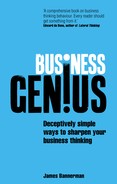The second Block and Limitation to Business Genius is a lack of confidence.
The good news, however, is that, if this resonates with you, you’re in good company. Many Business Geniuses – from Frank W. Woolworth to Thomas Edison – started out with low levels of confidence, yet managed to UP! their confidence as their careers evolved.
Anyway, what we need to remember is that no one is 100 per cent confident all the time. We have, instead, what are called ‘pockets of confidence’.
A pilot, for example, might feel highly confident landing a plane in a storm (because they’ve experienced doing so many times before) yet feel like a quivering wreck if they had to perform in a West End show (on the opening night of a play they’d never rehearsed for). In fact, even the acting Genius Lawrence Olivier never really lost his stage fright, but let’s not go there …
The point is, next time you lack confidence, please be kind on yourself, and bear in mind that confidence (which comes from the Latin word confidere) means trust – i.e. ‘Trust in our natural ability to do something’ – and luckily this trust can be developed and nurtured.
To achieve this, though, it can help to be aware of what Martin Perry calls the ‘Confidence Spectrum’ (which he explores in detail in his book Confidence Booster Workout: 10 steps to beating self-doubt ). Put simply, Perry’s Confidence Spectrum stretches along five zones:
Arrogance; supreme confidence; confidence; self-doubt; low self-esteem
As you can see, confidence is in the middle, whilst arrogance and low self-esteem are at either end. But here’s the intriguing mind twist.
Over the years, I’ve asked all kinds of seminar groups the following question: ‘What’s the key difference between confidence and arrogance? Where does one become the other?’ And many have struggled to locate a precise point. Perry, however, sums this up brilliantly with one word: assumptions.
Why?
Well, Perry uses the metaphor of someone running a race. A confident runner, for example, would say, ‘I can win’ (i.e. natural ability + trust).
A supremely confident runner, meanwhile, would say, ‘I will win’, because it’s basically the same with a touch of belief thrown in.
But here’s the difference! An arrogant person says, ‘I always win.’
Can you hear the difference?
Admittedly, they may well win and, statistically, they may even be 99.9 per cent likely to win. If they assume they’ll win, however, that would be arrogant!
So, no wonder arrogance is ubiquitous in the world of business: arrogant bosses who assume their opinion is the only one worth listening to; arrogant managers who assume they don’t need to listen to what’s being said because they know it all already. You know what I mean …
‘And what about the other end of the spectrum?’ you may well ask.
Well, if a person’s self-trust gets damaged – perhaps because they’ve given a poor business presentation, having fumbled their lines, or perhaps let their team down on a project and lost a crucial deal – that’s when confidence can often spiral down into one of two things:
- Self-doubt (i.e. natural ability – trust), in which a runner might say, ‘I’ll probably lose’; or
- Low self-esteem, where a lack of self-worth triggers an equally harmful assumption: ‘I always lose, so what’s the point in even running?’
‘Fair enough,’ you may well be thinking. ‘So what? I can think of plenty of Business Geniuses who’ve been incredibly arrogant, and it hasn’t done them any harm. And I can also think of many Business Geniuses who, deep down, have low self-esteem, yet have still managed to prosper.’
I agree.
All I’m saying here is that if you really want to maximise your Business Genius, confidence (rather than arrogance or low self-esteem) is more likely to help you. Or, as academics would say, self-efficacy is most likely to help you, which is a term Professor Bandura of Stanford came up with, and means ‘our belief in our ability to succeed in specific situations’.
Consider David Seidler, for example. When he was a young boy he suffered from a nervous stutter (which undermined his confidence, and made his stutter even worse). ‘Don’t worry,’ his parents would say, ‘even Bertie [King George VI of England] had a stutter.’ Seidler could easily have dismissed this insight and become increasingly withdrawn, but he didn’t. Years later, as Business Geniuses often do, he ingeniously transformed what could be considered his disadvantage into an advantage and ended up writing a screenplay on stuttering called The King’s Speech, which was crowned best film at the Oscars in 2011!

UP! YOUR CONFIDENCE
NUGGET
The actor Sean Connery – who many still regard as the ultimate James Bond – was once asked about the secret of his success. His answer was simple: ‘Confidence, confidence, confidence.’
Now, let’s face it, that was probably easy for him to say this (with his movie-star good looks and muscle-man physique) but the point Connery was making was an important one. Often, in business, as Peter Jones – the author of Tycoon and UK entrepreneur and Dragon’s Den investor – writes:
‘The bottom line is, if you don’t believe in yourself or your idea, why should anyone else?’
And Connery is living proof of this.
When he turned up for the Bond audition in 1962, he was aware he had only an outside chance of winning the role, so he decided to ‘put on a bit of an act’.
He strolled into the room with the power and grace of a cat (having been trained by the Swedish movement and posture specialist Yat Malmgren) and did everything he could to ooze self-assuredness and impress film producers Cubby Broccoli and Harry Saltzman. And it paid off.
According to Connery’s biographer Christopher Bray, the moment he left the audition, they knew they’d got their man: ‘It was the sheer self-confidence he exuded,’ Broccoli went on to say. Please note, however, for confidence to work effectively, you need to believe it first (intra-psychically) otherwise – as neuro-linguistic programming research indicates – there’s a danger your body language and physiology will soon give the game away, regardless of the words we use. So, remember, confidence matters: ‘Not so fast, Goldfinger …’


USEFUL TIPS AND
ESCAPE STRATEGIES
Unfortunately, there’s no magic wand that’s guaranteed to instantly UP! your confidence. Here are three tips and strategies, however, which can significantly help you to help yourself:
1 EXPAND YOUR PRESENCE
Many confidence experts argue that charisma is something you’re either born with, or you’re not. So let’s forget about charisma. Let’s focus instead on presence, because presence is something we can do something about!
According to presence expert Meribeth Bunch in her book Creating Confidence: How to develop your personal power and presence, ‘Presence has to do with a sense of space and how to use it.’
With this in mind, here are two practical ways to expand our presence.
Firstly, Bunch explains, we need to keep telling ourselves, ‘I want to be here.’ Yes, I know it sounds a bit bizarre, but think about it. What usually happens when we’re lacking in confidence? We tell ourselves the complete opposite. For example, ever seen someone give a talk and then move on to the Q & A part? Most have vanished before the first question …
Secondly, linked to the above, Bunch recommends that – wherever we are – we imagine we’re back in the comfort of our own home. Why? ‘Because our behaviour changes when we feel at home’. It’s our turf, so to speak; it’s where we usually have the upper hand, and psychological advantage. So, if you want to UP! your presence consider this:
Q1 How much personal space (energy field) are you occupying at the moment, and how much more confident would you feel if it was 10 times larger or 100 times larger?
2 HARMONISE YOUR MESSAGE
Over the years I’ve worked with all kinds of people in companies helping them to improve their presentation skills. Intriguingly, one of the things they find most challenging is knowing what to do with their hands when speaking to an audience.
Keep your hands behind your back and risk looking too formal; keep your hands in your pockets and risk looking too casual; keep moving your hands all over the place (and nervously fiddle with a pen, or shuffle your papers) and you risk deeply irritating your audience.
Well, evidently, the secret is that it doesn’t really matter what you do with hands, as long as you use them ‘in harmony with your message’. So, if you want to emphasise one point, maybe raise one finger and say, ‘If there’s one thing you take away from this presentation, I hope it’s this’; or, if you want to say, ‘The whole department needs to come together on this,’ bring your hands together. It’s called the ‘the puppetry of the hands’, so next time you watch a confident speaker, simply watch and learn how they do it.
3 KEEP FORGETTING YOURSELF
Many people who lack confidence in business do so because they’re incredibly self-conscious.
They become prisoners of the four enemies of confidence, which Perry identifies as:
- worrying too much what others think;
- doubting our skills and abilities;
- continually comparing ourselves with others;
- fearing failure.
The best antidote to this is simply to do the opposite.
For example, one of the best bits of advice I ever came across – from a presentation skills perspective – was to think of ourselves as a messenger. You’re simply there to hand over a message, and what others do with that message is a different story. In other words ‘It’s not about you!’
And the moment this happens our presentations normally improve because the best presentations – according to Professor of Psychology Adrian Furnham – are usually less about presentation skills, and more about anxiety management.
Finally, here’s some food for thought to bring it back to the world of Business Genius. Hermes, in Ancient Greek mythology, was not only the messenger of Zeus (with his snazzy winged boots), he was also the God of commerce and merchants. Furthermore, if it wasn’t for the Ancient Greeks we wouldn’t have companies called Nike, Argos, Omega or Amazon at all …

BUSINESS GENIUS IN ACTION:
NEXT STEPS …
In summary, if you want to UP! your confidence, here’s how:
- Pinpoint where you see yourself on the ‘Confidence Spectrum’ (so you can start questioning the assumptions that can hold you back).
- Investigate the confidence success stories of others (because – as we explored in the David Seidler example – finding out how others have managed to turn their setbacks into stepping stones can often inspire us to get beyond whatever’s standing in our way).
- Leverage the power of self-belief, as Sean Connery did (for if you don’t believe in yourself or your idea, why should anyone else?).
- Orchestrate a plan for telling yourself, ‘I want to be here’ (to enable you to expand your personal presence).
- Target the four enemies of confidence to silence your inner critic (because the less you worry about what others think, doubt your own abilities, continually compare yourself with others, and fear failure, there’s a high probability your confidence level will instantly increase).
